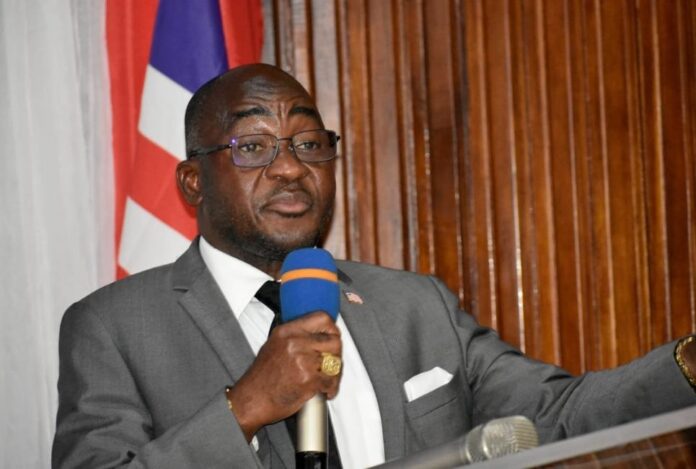MONROVIA – The Center for Transparency and Accountability in Liberia (CENTAL) has commended the Coalition for Democratic Change (CDC) for passing Fiscal Year 2024 Millennium Challenge Corporation (MCC Score Card, Calls for Greater Actions to Address Impunity for Corruption.
Anderson D. Miamen, CENTAL Executive Director addressing a press conference on Friday, November 10, 2023 while CENTAL acknowledges the feat, significant efforts are still needed, especially, he said in terms of the Controlling Corruption indicator directly linked to the country’s fight against Corruption.
He said the improvement in the controlling corruption indicator, from 54% in 2023 to 59% in 2024 is well-noted. However, he added the CENTAL would like to stress the need for more efforts in addressing the culture of impunity – just as the need to address impunity existed in 2012, when Liberia obtained her second highest controlling corruption score of 78% and the biggest score of 41/100 on the corruption perception index of Transparency International, the issue still persists today. See statement below:
On Tuesday, November 7, 2023, the Millennium Challenge Corporation (MCC) released its fiscal year (FY) 2024 country scorecards. The Millennium Challenge Corporation is an independent U.S. government agency working to reduce global poverty through economic growth. The Scorecards consist of a collection of 20 independent, third-party indicators that measure a country’s policy performance in the areas of economic freedom, ruling justly, and investing in people. Also, the scorecards are a key component in MCC’s competitive country selection process that determines which countries are eligible to develop a five-year grant agreement, known as a compact, especially in FY 2024.
Accordingly, of the 80 country scorecards created by MCC for Fiscal Year 2024, 25 countries passed (Liberia included), while 55 countries failed. The Center for Transparency and Accountability in Liberia (CENTAL) applauds the Liberian Government for passing 14 (70%) of the 20 indicators covered by the scorecard. We are glad about the progress made in different areas, including but not limited to controlling corruption, fiscal policy, and employment opportunity. It is particularly pleasing to note that, overall, Liberia outperformed her immediate neighbors and Mano River Union counterparts. The Country passed 14 out of the 20 indicators (70%), compared to 11 out of 20 (55%) for Ivory Coast; 10 out of 20 (50%) for Sierra Leone; and 6 out of 20 (30%) for Guinea respectively.
While we acknowledge this feat, significant efforts are still needed, especially in terms of the Controlling Corruption indicator directly linked to the country’s fight against Corruption. The improvement in the controlling corruption indicator, from 54% in 2023 to 59% in 2024 is well-noted. However, we would like to stress the need for more efforts in addressing the culture of impunity. Just as the need to address impunity existed in 2012, when Liberia obtained her second highest controlling corruption score of 78% and the biggest score of 41/100 on the corruption perception index of Transparency International, the issue still persists today.
Despite always passing this indicator, with the maiden 2008 edition being the only exemption, when Liberia obtained a 45% failing mark, the country is still faced with the challenge of robustly enforcing her anti-corruption laws and policies. Also, ending impunity for corruption remains a major hurdle, especially cases and issues involving high profile public officials and other individuals in society. The US Government recognizes this fact, evidenced by sanctions it has imposed on Senator Prince Y. Johnson, Senator Varney Sherman, and other former senior public officials for significant corruption. These persons are yet to be investigated and prosecuted by the Liberian Government. Further, multiple past and current audit reports released by the General Auditing Commission(GAC) are still lingering, despite implicating several individuals and requiring administrative and other concrete actions. Therefore, we urge government to intensify anti-corruption efforts and not remain complacent due to its performance on the scorecard. As stated earlier, while Liberia has nearly always passed the Control of Corruption indicator, seemingly due to improvements in anti-corruption policy framework, corruption remains a challenge due to lack of political will and poor implementation of laws.
Recommendations:
Once again, CENTAL welcomes the progress made and lauds the Liberian Government for the said improvement. However, we call for greater actions from national government to ensure that the passage is not only on paper, but translates into tangible results and improvements in the quality of lives/living conditions of the people. We call for continuous efforts to improve upon indicators with passing scores, such as Controlling Corruption where impunity for corruption remains high, despite the country having very good anti-corruption laws and policies. Also, we encourage Government to pay keen attention to areas in which it failed, including regulatory quality, government effectiveness, girls’ primary education completion rate, education expenditure, natural resource protection, and child health. Finally, we call for greater support and partnership from development partners, civil society, the media and other stakeholders to help national government to sustain and significantly improve upon the gains made.







